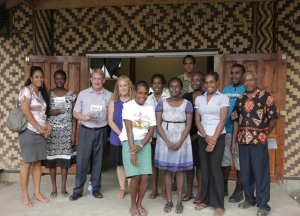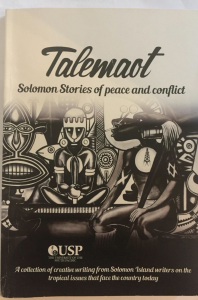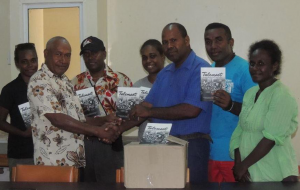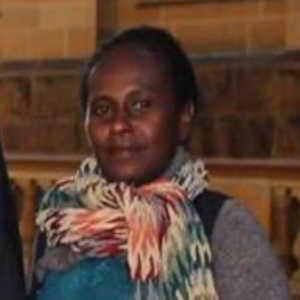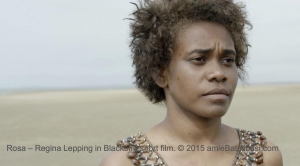Maureen Duffy: Postcards from the International Authors Forum
KING'S COLLEGE LONDON, 2017
Solomon Islands Creative Writers Association
Presentation by Christina Kuper-Wini
Thank you for including Solomon Islands in your programme today. On behalf of the Solomon Islands Creative Writers Association I would like to share sincere appreciation for making us visible. Sincere thank you to King’s College, Maureen Duffy, and Katie Webb who have all been instrumental in making my participation here possible.
My name is Christina and I am an advocate for Solomon Islands small communities, especially projects involving youth and women.
Today I would like to briefly introduce the Solomon Islands Creative Writers Association and highlight the 2016 publication called Talemaot which means Say it or Speak about it. Talemaot is about Solomon stories of peace and conflict.
Then I will share two personal stories: one about the current President of the Association - Jasmine Navala Waleafea, an avid writer and poet; the other about the Secretary, Regina Lepping, who recently won an award in Sydney, Australia for her lead role in a short film titled Blackbird.
We will finish with a 10 minute showing of another short film titled The Test.
Solomon Islands is the 5th largest Oceanian country by population (approximately 600 thousand people). An archipelago of islands totalling 28, 400 sq km of land lying approximately 3 hours north east of Australia. Today there are between 60 - 70 different indigenous languages still spoken.
Someone once asked me, “how can 600 thousand people speak so many languages? And how many languages does each person speak?”
Introducing the Solomon Islands Creative Writers Association (SICWA)
SICWA was established in 1983 as an avenue to recognise and encourage the interests of amateur writers, and continues to play an important role in capturing and writing Solomon Islands history through literature.
There are currently 43 members of the Association. With such a small membership, it is apparent that not every writer is a member of the Association. For there are writers and poets who do not publish their works, maybe because our culture is more oratory.
The Association meets on a monthly basis in the capital, Honiara. Members are scattered throughout the archipelago and sometimes it can be weeks before most come back to capital, especially after holidays and school breaks.
The Association runs its business from membership fees, funding and revenues received from publications.
Since 2013, the Association started looking at collecting stories towards annual publications.
Talemaot is about Solomon stories of peace and conflict stemming from the 2002 Ethnic Tension and Crisis. There was no peace for people from the two groups of islands concerned, as arms were raised against each other. It was the first time since WWII that armed men roamed and there was widespread fear throughout the Islands.
To create Talemaot, writers were trained in workshops over about 3 months, discussing, giving constructive feedback to each other and writers submitted several drafts for improvements, as most needed help expressing fiction in the English language. With so much time spent together, differences arising from the Ethnic Tension diminished and friendships formed. A collection of short stories and poems was born.
Without the support of the UNDP CPAD's project and the British High Commission in Solomon Islands it would have been difficult to publish the first edition.
And adding to the growing number of Pacific collections archived at the University of the South Pacific the 2016 revised edition was published by the university press.
Jasmine Navela Waleafea
Who is Jasmine Navala Waleafea? Not well-known as Maureen Duffy, but in Solomon Islands Jasmine has come to represent a role model for our young writers. Not only is she a well educated woman working in the National Parliament of Solomon Islands but she is the current President of SICWA.
Her short story titled Brother we're caught in a trap expresses the social, political and economic situation experienced during the Ethnic Tension.
Jasmine's childhood was not easy as she was an orphan. To escape the realities of life, like her father, Jasmine would write short stories and poems as a way of self-expression. Jasmine paid her way through high school by working different jobs. And finally through scholarship, she received her Arts Degree in Secondary Education in English Literature from the Pacific Adventist University.
Jasmine says “it's not who I am today that matters most, but the journey to getting here is what I value most.”
Regina Lepping
A fews weeks ago as I was preparing to come to this event my communications with Regina were mostly about her interest in filmmaking and film script writing. I hadn't realised that Regina won the award for Best Female Lead role in a film titled Blackbird, at the Sydney Indie Film Festival 2017: a short film directed by Amie Batalibasi about sugar cane slave workers in Australia.
Regina does freelance work writing for local magazines/papers and currently works for UNDP Peace-building Fund as a Youth Empowerment and Engagement Officer. Regina and her twin sister, Georgina both enjoy volunteer work with Red Cross during natural disasters and crisis.
In 2014 Regina created a group called Honiara Filmmakers Club.
Her 21 minute film Broken Wind Chimes was produced by a local film producer Sukwadi Media and is dedicated to the flood victims as it was shot just after a flash flood in Honiara in 2014.
Regina, like Jasmine, went through difficult times during the Ethnic Tension and Crisis in Solomon Islands. At one point a man came to their home, pointed a gun at her mother and demanded their vehicle. Her mother spoke to the man in his dialect, he apologised and left.
Regina has a favourite local video rental shop. During the Ethnic Tension the shop got burnt down. Regina always remembered this shop as this was how her love for film started.
Both Regina and Jasmine say the tough experiences allowed them to create stories from real emotions and characters.
*
This is an edited version of the presentation by Christina Kuper-Wini given at King's College London, 10 October 2017. Our thanks to Christina for allowing us to reproduce it here.
Navigation
Maureen Duffy Special Feature Main Page
Postcards from the International Authors Forum introduced by Katie Webb
Solomon Islands Christina Kuper, the Solomon Islands Creative Writers Association (SICWA)
South Korea Oum Jeongsoon, ‘Another way of seeing’
Italy Ida Baucia, the Writers’ Union of Italy (FUIS)
South Africa ANFASA, the Academic and Non-Fiction Authors of South Africa
Sudan Professor Ahmed El Safi, The Sudanese Writers Union
Israel Vered Cohen Barzilay, ‘Literature as a Bridge Between Cultures and the Power of Diversity’

